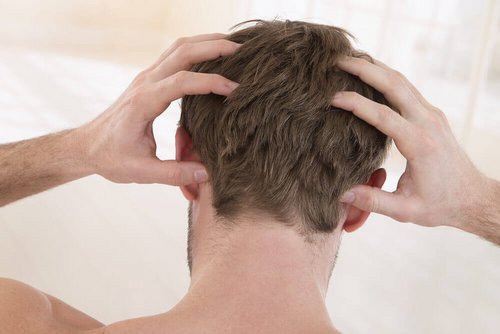Dry scalp
How to restore moisture to a parched scalp
A dry, itchy, burning and perhaps even scaly scalp can be uncomfortable or even painful for those affected.
The scalp, like all other areas of skin, is normally protected by a moisture barrier. When this moisture barrier becomes imbalanced, the scalp dries out.
This moisture balance is protected by an intact lipid film that surrounds a healthy scalp. When this lipid film is disturbed and has gaps, the skin loses moisture, resulting in an imbalance.
A dehydrated scalp is no longer able to fulfill its protective function and can become sensitive, itchy and flaky.

Symptoms of a dry scalp
A dry, sensitive scalp can no longer fulfill its protective function, which leads to itching and dry dandruff. The loss of moisture from the scalp can also lead to redness or feelings of tension. In addition, the hair can also appear straw-like and become brittle.
Causes of a dry scalp

Genetic predisposition can determine whether one is prone to dry skin. However, dry scalp can also be caused by external influences such as weather conditions. In winter, it is the cold air outside as well as the dry heating air inside. In summer, it is the hot, dry air with additional exposure to the sun. Regular swimming in chlorinated water can also dry out the scalp in summer.
Skin diseases such as atopic dermatitis and psoriasis, but also the natural aging process can be further causes.
Caring for a dry scalp
Depending on personal care habits, too frequent and too hot washing and blow-drying, can dry out the scalp. Therefore, it is advisable to let the hair air dry as often as possible. Hair styling products as well as coloring and bleaching can also irritate the scalp.
To prevent dry scalp, these triggers should be reduced. Especially for extremely dry skin prone to atopic dermatitis or psoriasis, it is important to use suitable care products to cleanse the scalp and hair.
- Wrong shampoo: Anyone who thinks they can help extremely dry, flaky scalps with an anti-dandruff shampoo is unfortunately often mistaken. It could damage their skin further and worsen the burning and itching symptoms. The ingredients in classic anti-dandruff products contributes to degreasinge the scalp and can be too aggressive for dry scalps.
- Proper shampoo: A suitable shampoo should therefore not dry out the scalp any further. The hair and scalp should be gently cleaned, e.g., with Linola Shampoo or Linola Forte Shampoo.
- Wrong conditioner: Hair conditioners are often used for additional care. However, many conditioners can only be used for hair but not for scalp care. Ingredients often include silicones, which could be deposited on the scalp and have an occlusive effect, exacerbating dryness.
- Proper conditioner: A conditioner that is also suitable for dry scalp should not contain silicones and sulfates. In addition, attention should be paid to nourishing ingredients that moisturize and are tailored to the needs of dry scalp. Linola hair & scalp conditioner, for example, is suitable since it includes valuable plant oils that are particularly rich in linoleic acid.
In addition, care should be taken not to take showers or baths that are too hot, as this puts additional strain on the skin and hair. A water temperature of 32-36°C is therefore ideal.
Moreover, excessive washing of the hair might stress the lipid film.
Linola shampoos for sensitive scalps
Linola shampoos were especially developed for sensitive and dry scalps with particular care needs.
Linola Shampoo uses the special composition of the glucose-based cleansing ingredients to cleanse the scalp and hair very gently. The natural moisture retention regulators and linoleic acid in the shampoo help to prevent scalp dryness and irritations.
Linola Forte Shampoo is designed to meet the special care needs of itchy scalps prone to psoriasis. ·It relieves itching and soothes irritated scalps. Linoleic acid supports the skin's protective barrier.
Regular use of Linola shampoos can help to noticeably relieve the symptoms of a dry scalp.

